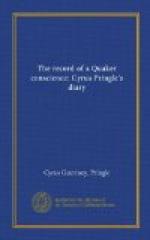But the Quakers have never been champions of the negative. They do not take kindly to the role of being “antis.” Their negations grow out of their insistent affirmations. If they are against an established institution or custom it is because they are for some other way of life which seems to them divinely right, and their first obligation is to incarnate that way of life. They cannot, therefore, stand apart in monastic seclusion and safely watch the swirl of forces which they silently disapprove. If in war-time they do not fight, they do something else. They accept and face the dangers incident to their way of life. They feel a compulsion to take up and in some measure to bear the burden of the world’s suffering. They endeavour to exhibit, humbly and modestly, the power of sacrificial love, freely, joyously given, and they venture all that the brave can venture to carry their faith into life and action. In the American civil war, in the Franco-Prussian, the South African, the Balkan, the Russo-Japanese, small bands of Quakers revealed the same spirit of service and the same obliviousness to danger which have marked the larger groups that have manned the ambulance units and the war-victims’ relief and reconstruction work of this world war. In this present crisis they have gone wherever they could go,—to Belgium, to France, to Russia, to Italy, to Serbia and Greece and Syria and Mesopotamia,—to carry into operation the forces of restoration and of reconstruction. They have not stood aloof as spectators of the world’s tragedy. They have entered into it and shared it, and they have counted neither money nor life dear to themselves in their desire to reveal the power of redeeming and transforming love.
Slowly the sincerity of the Quaker conviction about war has made itself felt and limited legislative provisions have been made, especially in England and America, to meet the claims of conscience. The problem which confronts the law-maker, even when he is sympathetic with the rights of conviction, is the grave difficulty of determining where to draw the line of special exception to general requirements and how to discover the sincerity of conscientious objection to war. The “slacker” is always a stern possibility. There must be no holes in the net for him to escape through. The makers of armies naturally want every man who can be spared from civilian life and can be utilized for military operations. It has consequently often seemed necessary for law-makers to be narrow and hard toward the obviously sincere for fear of being too easy and lenient with those suspected of having sham consciences.




